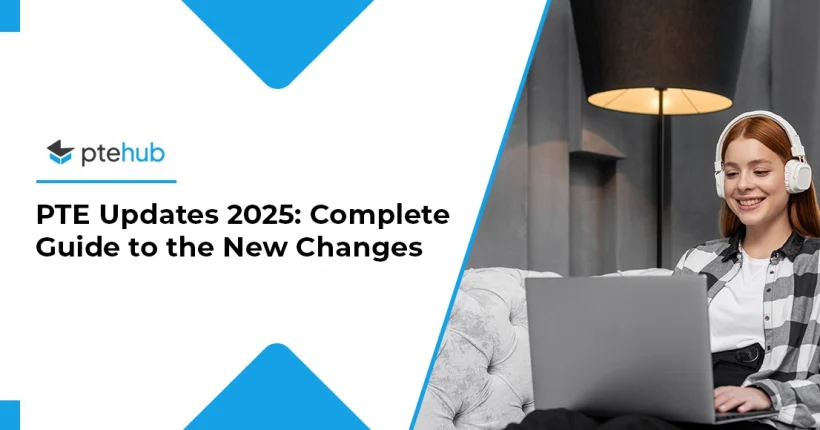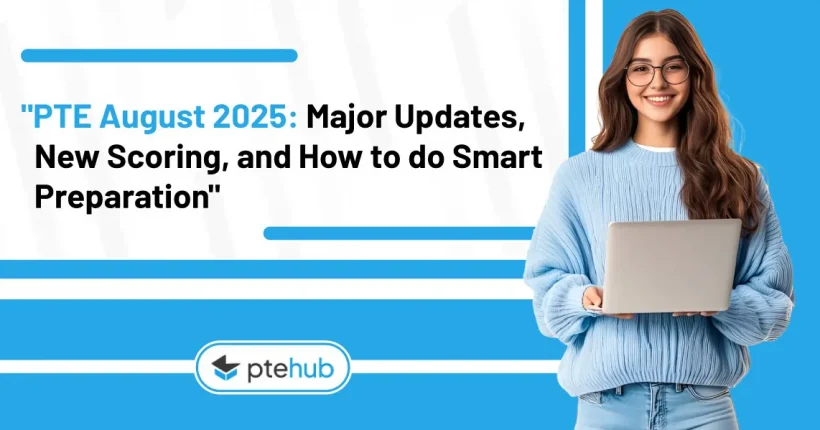If you’re preparing for the PTE Academic Exam, you’ve probably heard the term “PTE prediction questions” everywhere: in Telegram groups, YouTube channels, and online forums. But what exactly are these questions? And can they really guarantee your success in the PTE test?
In this comprehensive guide, we’ll explain everything you need to know about PTE prediction questions, how they work, where to find them, and most importantly, how to use them strategically to get your desired score.
🔑: Key Highlights
-
- Master Real Exam Patterns: Get familiar with high-frequency PTE questions from all modules, like Speaking, Writing, Reading, and Listening, based on real exam trends and global updates.
- Boost Accuracy & Confidence: Practise prediction questions strategically to improve fluency, time management, and scoring potential in tasks like Repeat Sentence and Write from Dictation.
- Study Smart, Not Hard: Save time by focusing on trusted 2025 PTE prediction sets from reliable sources like E2Language and PTE Tutorials; this is the smart way to aim for 79+ scores.
What Are PTE Prediction Questions?
PTE prediction questions are a set of repeated or highly expected questions compiled from real exam experiences and question bank updates. These questions are based on the Pearson Test of English (PTE) patterns and are believed to reappear in upcoming exams.
They include commonly repeated questions from:
- Speaking: Repeat Sentence, Describe Image, Retell Lecture
- Writing: Summarise Written Text, Essay Writing
- Reading: Fill in the Blanks (Reading & Writing), Reorder Paragraphs
- Listening: Write from Dictation, Fill in the Blanks, Highlight Incorrect Words
These prediction files are updated monthly or weekly by various PTE institutes and experts who track question patterns globally.
Why Are PTE Prediction Questions Important?
PTE prediction questions are not a cheat sheet but rather a smart preparation strategy. Here’s why they matter:
1. Familiarity with Real Exam Patterns
Practising prediction questions helps you understand what types of questions commonly appear in the PTE exam. This builds confidence and reduces anxiety.
2. Time Management Practice
Since prediction sets often replicate real exam timing and format, practising them helps you manage your response timing and improve your accuracy under pressure.
3. Focused Preparation
Instead of wasting time on hundreds of random practice sets, prediction questions allow you to focus on high-frequency topics that are likely to appear again.
4. Improved Scoring Potential
Since many candidates report seeing similar or identical questions from prediction files, your chances of scoring higher, especially in the Speaking and Listening sections, increase significantly.
PTE Prediction Questions for Each Module (2025 Edition)
Let’s go through each module and explore what kind of prediction questions you can expect.
1. Speaking Section
Key Tasks:
- Read Aloud
- Repeat Sentence
- Describe Image
- Retell Lecture
- Answer Short Question
Common 2025 Prediction Topics:
| Task | Example Prediction Questions | Strategy |
| Read Aloud | “Global warming has become a serious concern for scientists.” | Focus on pronunciation and fluency, not speed. |
| Repeat Sentence | “The university library will be closed during the holidays.” | Listen carefully and repeat in the same tone. |
| Describe Image | Graph showing temperature change over a decade | Use structured responses: Introduction → Key Trends → Summary. |
| Retell Lecture | Audio about AI in education | Take notes quickly and summarise logically. |
| Answer Short Question | “What do you call a baby dog?” | Keep answers short and direct. |
Pro Tip:
Create a habit of practising 5–10 prediction questions daily for speaking tasks. Use online tools like E2Language, PTE Tutorials, or PTE Magic for real exam simulation.
2. Writing Section
Key Tasks:
- Summarise Written Text
- Essay Writing
2025 PTE Prediction Topics:
| Task | Example Prediction Question | Tip |
| Summarise Written Text | A passage on “The impact of digital technology on education” | Write one clear, concise sentence with correct grammar. |
| Essay Writing | “Do you think technology has made people less social?” | Use a simple 4-paragraph structure: Introduction, Two Body Paragraphs, Conclusion. |
Common Essay Topics Predicted:
- Globalisation and culture
- Environmental pollution
- Online education
- Impact of social media
- Automation and jobs
Pro Tip:
Use templates smartly. Pearson’s AI system values coherence, spelling, grammar, and word count (200–300 words). Keep sentences short and meaningful.
3. Reading Section
Key Tasks:
- Reading & Writing: Fill in the Blanks
- Multiple Choice, Single/Multiple Answers
- Reorder Paragraphs
- Fill in the Blanks (Reading Only)
2025 Prediction Topics and Strategies
| Task | Example Prediction Question | Strategy |
| Reading & Writing: FIB | “The company decided to _______ its policies to attract more customers.” | Focus on collocations (e.g., revise policies). |
| Reorder Paragraphs | A story about climate change initiatives | Identify logical flow and linking words (however, therefore, moreover). |
| Fill in the Blanks (Reading) | Vocabulary-based blanks | Learn 1000+ common collocations. |
Pro Tip:
Practise vocabulary and grammar patterns daily. Websites like PTE Practice App or PTE Study Portal publish updated prediction PDFs weekly.
4. Listening Section
Key Tasks:
- Summarise Spoken Text
- Fill in the Blanks
- Highlight Correct Summary
- Multiple Choice
- Select Missing Word
- Write from Dictation
2025 Common Prediction Questions:
| Task | Example Prediction | Tip |
| Summarise Spoken Text | Audio on “The effects of plastic pollution” | Take short notes; use 50–70 words. |
| Write from Dictation | “The results will be announced next Friday morning.” | Listen carefully and write exactly as heard. |
| Fill in the Blanks | Gap-filling with audio about economics | Focus on spelling accuracy. |
Pro Tip
“Write from Dictation” contributes heavily to your writing and listening scores. Practise at least 20 daily prediction dictations from the updated 2025 lists.
Where to Find Reliable PTE Prediction Questions (2025 Updates)
Not all prediction question files online are trustworthy. Some are outdated or incomplete. Here are reliable sources for up-to-date PTE prediction materials:
- E2Language.com – Offers monthly updated prediction question banks.
- PTE Tutorials – Provides real-time question updates and mock tests.
- PTE Magic – Known for free Telegram group updates and AI-based practice.
- Real PTE Exam Telegram Channels – Many share actual exam memory-based questions.
- YouTube Channels – PTE Study Centre, PTE Academic Guru, etc.
Always verify the last updated date before using any file.
How to Use PTE Prediction Questions Effectively
Practising prediction questions the right way can transform your results. Follow this step-by-step strategy:
Step 1: Take a Mock Test First
Before diving into predictions, attempt a full mock test to know your strengths and weaknesses.
Step 2: Focus on High-Weightage Tasks
Prioritise tasks that carry more marks:
- Repeat Sentence
- Read Aloud
- Write from Dictation
- Fill in the Blanks (Reading & Writing)
Step 3: Practise Repeated Questions Daily
Spend at least 1 hour daily on prediction question practice, focusing on fluency, accuracy, and time management.
Step 4: Analyse Your Mistakes
After each practice, identify error types such as pronunciation, spelling, grammar, or comprehension, and fix them gradually.
Step 5: Combine Prediction with Core Learning
Use prediction questions as a booster, not as your entire preparation. Combine them with grammar practice, vocabulary building, and official PTE materials.
Common Myths About PTE Prediction Questions
Let’s debunk a few misconceptions:
| Myth | Reality |
| “Prediction questions are leaked papers.” | False; they’re based on repeated patterns and memory recalls. |
| “You don’t need to study grammar if you use prediction files.” | Wrong; grammar and structure are still crucial. |
| “All PTE questions repeat exactly.” | Some do, but not all; use prediction as a supplement, not a substitute. |
| “Practising only prediction files guarantees 90+.” | Not necessarily; performance also depends on pronunciation, coherence, and fluency. |
Expert Tips to Maximise Your PTE Score
1. Follow AI Evaluation Tools
Use apps like PTE Tools or ApeUni PTE for real-time scoring and feedback.
2. Create a Study Routine
Allocate fixed hours daily for each section, and revise prediction sets weekly.
3. Don’t Over-Memorise
Understand the concept instead of just memorising sentences.
4. Stay Updated
Join PTE Telegram groups or Reddit communities to get fresh prediction lists.
5. Use Real Test Environment Practice
Practise with timer and microphone settings similar to the real PTE exam.
Conclusion
PTE prediction questions can be your secret weapon for scoring 79+ in the PTE Academic exam, but only if used smartly. They help you understand real exam trends, improve confidence, and reduce preparation time.
However, remember that success comes from a balance of prediction-based practice and conceptual understanding. So, stay consistent, practice strategically, and you’ll be well on your way to achieving your dream PTE score.
PTE EXAM Courses!
Get Best PTE Cpurses At Affortable Pricing
FAQs
1. Are PTE prediction questions 100% accurate?
No, they are based on repeated trends, but accuracy varies between 60% and 80%.
2. How often should I practise prediction questions?
Practise at least 1 hour daily, updating your set every 2 weeks.
3. Where can I download the latest prediction questions?
Trusted platforms include E2Language, PTE Tutorials, and ApeUni.
4. Can I rely only on prediction questions to get 79+?
Not entirely; combine them with concept-based learning and mock tests.
5. Are prediction questions available for PTE Core and PTE Academic?
Mostly for PTE Academic, but some platforms are updating prediction sets for PTE Core as well.





